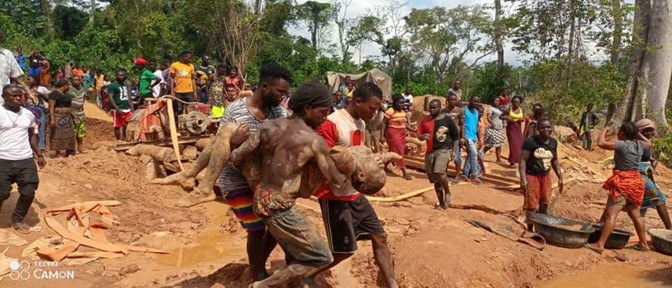The Devastating Impact of Illicit Mining on Liberia’s Economy and Society
Liberia, a nation endowed with abundant mineral resources like gold, diamonds, iron ore, and bauxite, has historically relied on mining as a cornerstone of its economy. However, the past two decades have witnessed a surge in illicit mining activities, predominantly artisanal and small-scale mining (ASM) operations, conducted outside the legal framework. This illegal mining, concentrated in resource-rich counties with limited state presence, presents a grave threat to Liberia’s economic integrity, environmental sustainability, and social fabric. While providing short-term income for some impoverished Liberians, the long-term costs are devastating, eroding the foundations of economic progress and jeopardizing the nation’s future.
One of the most significant economic consequences of illicit mining is the substantial revenue loss incurred by the Liberian government. Despite earning over US$1.63 billion from the legal extractive sector between 2009 and 2021, a significant portion of the country’s actual mineral output remains untaxed and unrecorded. An estimated 70-90% of Liberia’s gold production is smuggled out of the country annually, resulting in revenue losses between US$150 million and US$450 million. This loss of vital resources hinders funding for crucial public services like infrastructure, healthcare, and education, severely constraining national development planning and exacerbating budget shortfalls. Furthermore, the illicit mining sector fuels informal trade networks, contributing to currency instability, inflation, and reduced investor confidence.
The environmental degradation caused by illicit mining is equally alarming. Unauthorized miners engage in destructive practices such as deforestation, river diversion, and the use of harmful chemicals like mercury and cyanide. These practices result in widespread deforestation, water pollution, soil erosion, and habitat destruction in ecologically sensitive areas, including Sapo National Park. The destruction of this biodiversity hotspot not only undermines Liberia’s ecotourism potential and deprives local communities of livelihood opportunities but also reduces the country’s capacity to participate in global climate financing mechanisms. The contamination of water bodies with mercury and cyanide poses severe health risks to communities dependent on these rivers for drinking water, fishing, and irrigation.
At the community level, illicit mining fuels social disruption, including the breakdown of traditional authority structures, displacement of families, increased conflict, and a rise in sexual and gender-based violence (SGBV). Vulnerable populations, particularly women and children, are subjected to exploitation, trafficking, and abuse in unregulated mining camps. The lack of formal employment opportunities pushes many individuals into dangerous and unsustainable working conditions, while the proceeds from untaxed mineral exports are laundered through criminal networks, further eroding the government’s tax base and facilitating corruption.
The human cost of illicit mining is substantial, with frequent fatalities and injuries occurring in unsafe mining operations, particularly due to collapsing mine shafts. These accidents, often involving young men who are the primary breadwinners for their families, result in economic distress for households and communities. The healthcare system is further burdened by mining-related injuries and the long-term health consequences of exposure to hazardous chemicals like mercury, placing additional strain on already limited resources. The psychosocial impact of these tragedies undermines economic efficiency and hinders human capital development.
Illicit mining is intrinsically linked to failures of governance and systemic corruption. The Ministry of Mines and Energy, tasked with regulating the sector, often becomes a facilitator of illegal activities, issuing licenses without proper vetting or oversight. Corruption at high levels of government perpetuates a culture of impunity, benefiting a select few while undermining national development. This corruption further discourages foreign investment, hinders accurate economic planning, and erodes public trust in government institutions. Compounding these challenges are the rampant exploitation of children in hazardous mining operations and the proliferation of drug abuse in mining communities, further crippling human capital development and escalating health and social crises.
Addressing the complex challenge of illicit mining requires a comprehensive and multi-faceted approach. Strengthening legal and institutional frameworks, reforming the Ministry of Mines and Energy, empowering local enforcement units, and promoting cross-border cooperation are crucial steps. Simultaneously, investing in sustainable alternative livelihoods, formalizing ASM operations, and prioritizing education, healthcare, and social protection programs are essential for mitigating the social and economic consequences of illicit mining. Restoring and protecting Liberia’s ecological assets, particularly Sapo National Park, is critical for environmental sustainability and long-term economic development. Ultimately, reclaiming Liberia’s future from the shadows of illicit mining requires bold political will, honest leadership, a commitment to transparency and accountability, and a united vision for sustainable and inclusive development.


